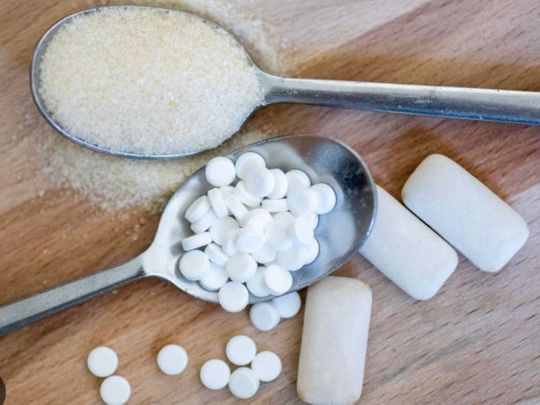
Abu Dhabi: After years of being used as a sugar substitute, aspartame has been labelled a “potential carcinogen” by a section of the World Health Organisation (WHO), thus reawakening concerns about the health dangers associated with the substance. Another arm of WHO, however, cleared the artificial sweetener for use at common levels.
READ MORE
- Aspartame: Popular artificial sweetener is 'possibly' carcinogenic, yet safe at common use levels, says WHO
- Artificial sweetener linked to higher heart attack, stroke risk: Study
- Aspartame: Popular artificial sweetener under scrutiny over cancer concerns from WHO
- Diet advice: No sugar, no artificial sweetener - what’s the alternative?
On July 13, a committee of 25 international experts reawakened concerns about the health dangers associated with the substance, after they determined that aspartame may “possibly” cause cancer in people. The International Agency for Research on Cancer (IARC) affiliated to the WHO, and based in the Lyon, France, labeled aspartame as a possible carcinogen, a substance that causes cancer, based on limited data.
The controversy escalated as a joint committee between the WHO and the Food and Agriculture Organisation (FAO) of the UN said the same day that the safety of aspartame isn’t a major concern at current levels of recommended consumption.
The substance is used in the manufacture of juices, soft drinks and low-calorie sweets.
Professor’s take
To find out more about aspartame, Gulf News met with Prof. Humaid Alshamsi, Professor of Oncology at Gulf Medical University and head of the Gulf Cancer Society.
He clarified certain facts about this substance, the safe ways to take it, and the medically permissible amounts to add it with the foodstuffs we eat.
However, unlike some artificial sweeteners that are excreted from the body nearly unchanged, aspartame is metabolised and has about 4 calories per gram.

Al Shamsi answered some of the most frequently asked questions (FAQs) about aspartame:
Is aspartame harmful to health?
“Aspartame is an artificial sweetener that has been extensively studied for its safety,” said Prof. Humaid Alshamsi. The consensus among regulatory authorities, such as the US Food and Drug Administration (FDA), the European Food Safety Authority (EFSA), is that aspartame is safe for consumption within acceptable daily intake levels. However, some individuals may have sensitivity or intolerance to aspartame, and they should avoid consuming it.”
How do we protect ourselves from its potential danger?
To protect yourself from any potential risks associated with aspartame or any other food additive, Al Shamsi recommends considering the following measures:
Moderate your intake: It is always a good idea to consume any food additive, including aspartame, in moderation. This allows you to diversify your diet and minimise the risk of excessive exposure to a particular substance.
What is the acceptable daily intake?
The acceptable daily intake as per the FDA in the US and EFSA in the European Union for aspartame is set by to 50 milligrams per kilogram of body weight (mg/kg/day).
This means that a person weighing 70 kg would have an acceptable daily intake of 3,500 mg per day.
A 355ml can of “diet” drink contains around 200mg of aspartame. Al Shamdi explained: “That means you have to drink 17 can of diet drink per day to reach the maximum daily intake.”
Read labels: Aspartame is commonly used in a variety of products, particularly low-calorie or sugar-free foods and beverages. So it is best to read food product labels carefully to identify if a product contains aspartame. This way, you can make informed choices and decide whether to consume it or opt for an alternative.
Consult a healthcare professional: If you have concerns about aspartame or any other food additive, it is advisable to consult a healthcare professional. They can provide personalised advice based on your specific health conditions, dietary needs, and any potential sensitivities you may have.
Consider natural alternatives: If you prefer to avoid artificial sweeteners altogether, you can explore natural sweeteners like stevia, monk fruit extract, or erythritol. “These options may offer a lower-calorie alternative to sugar without the use of artificial additives,” he said.
What about the use of aspartame in drinks and foods?
Al Shamsi said: “Aspartame is primarily used as a low-calorie artificial sweetener in a wide range of food and beverage products. It provides sweetness without adding significant calories, making it popular in products targeted towards individuals looking to reduce their sugar intake or manage their weight.
Some of the common uses of aspartame include:
* Carbonated beverages: Aspartame is commonly found in diet or low-calorie soft drinks and carbonated beverages, offering a sugar-free alternative to traditional sugary sodas.
* Powdered drink mixes: Aspartame is often used in powdered drink mixes, such as flavored water enhancers, powdered juice mixes, and instant iced tea or coffee products.
* Sugar-free or low-calorie desserts: Aspartame can be found in various sugar-free or reduced-calorie desserts, including gelatin desserts, pudding mixes, and some ice creams.
* Sugar-free chewing gum: Many brands of sugar-free gum use aspartame as a substitute sweetener.
* Yogurts and dairy products: Some yogurt and dairy products, particularly those labeled as “light” or “low-fat,” may contain aspartame to provide sweetness without the added sugar.
* Tabletop sweeteners: Aspartame is available as a tabletop sweetener in individual packets or bulk containers for use in coffee, tea, or other beverages.
“It’s important to note that aspartame is not heat-stable, meaning it may lose its sweetness when exposed to high temperatures for an extended period. Consequently, it is less commonly used in baked goods or other products that require prolonged heating during preparation. In such cases, other heat-stable artificial sweeteners like sucralose or a combination of sweeteners may be used instead.” He added.
Aspartame is considered safe for consumption by regulatory authorities and scientific organisations when consumed within acceptable daily intake levels.
What are the symptoms of aspartame intolerance?
Regarding the symptoms it causes, Al Shamsi said: “Aspartame is considered safe for consumption by regulatory authorities and scientific organisations when consumed within acceptable daily intake levels.”
However, some individuals may experience sensitivity or intolerance to aspartame, leading to potential symptoms. These symptoms can vary from person to person and may include:
Headaches: Headaches are one of the most commonly reported symptoms associated with aspartame sensitivity. Some individuals may experience migraines or tension headaches after consuming products containing aspartame.
Gastrointestinal issues: Digestive problems such as abdominal pain, bloating, gas, diarrhea, or irritable bowel syndrome (IBS) symptoms have been reported by a small number of individuals who are sensitive to aspartame.
Allergic reactions: In rare cases, aspartame may trigger allergic reactions in sensitive individuals, leading to symptoms like hives, itching, swelling, or difficulty breathing. If you experience any severe allergic reaction, seek immediate medical attention.
Neurological symptoms: Some people have reported neurological symptoms, such as dizziness, vertigo, mood changes, anxiety, depression, or memory issues, after consuming aspartame-containing products. However, scientific studies have not consistently supported a causal link between aspartame and these symptoms.
It’s important to note that these symptoms are relatively rare, and the vast majority of people can consume aspartame without experiencing any adverse effects.”
What are the safe sweetener alternatives?
Professor Al Shamsi said: “Regarding safe sweetener alternatives, there are several options available. Some of the commonly used alternatives include:
Stevia: Stevia is a natural, plant-derived sweetener extracted from the leaves of the Stevia rebaudiana plant. It is significantly sweeter than sugar but contains little to no calories. Stevia is considered safe for consumption and has gained popularity as a sugar substitute.
Monk fruit extract: Monk fruit extract is derived from the fruit of the monk fruit plant. It is intensely sweet, and like stevia, it has minimal or no calories. Monk fruit extract is generally recognized as safe (GRAS) by the FDA.
• Erythritol: Erythritol is a sugar alcohol that occurs naturally in certain fruits and fermented foods. It provides sweetness but has a minimal impact on blood sugar levels and contains fewer calories than sugar. Erythritol is generally well tolerated and considered safe for most people when consumed in moderate amounts.
• Xylitol: Xylitol is another sugar alcohol that is commonly used as a sugar substitute. It has a similar sweetness to sugar but contains fewer calories. Xylitol can have a laxative effect in high doses, so it’s important to consume it in moderation.”
• Sucralose: Sucralose is an artificial sweetener that is derived from sugar. It is much sweeter than sugar and is often used in low-calorie or sugar-free products. Sucralose has been extensively studied and is considered safe for consumption.
When choosing a sweetener alternative, it’s essential to consider your personal preferences, dietary needs, and any specific health conditions you may have.
Moderation is key, and it’s advisable to consult a healthcare professional or registered dietitian for personalized advice based on your individual circumstances to avoid any potential side effects.”
6,000
Number of food products sold worldwide that may be using aspartameWhat are the products that contain aspartame?
Aspartame was approved for use as a tabletop sweetener and in the production of chewing gum, cold breakfast cereals, beverages, gelatins, instant coffee, tea, puddings and dairy products.
In 1996, aspartame was approved as a general-purpose sweetener. Today aspartame may be part of 6,000 food products sold worldwide.













